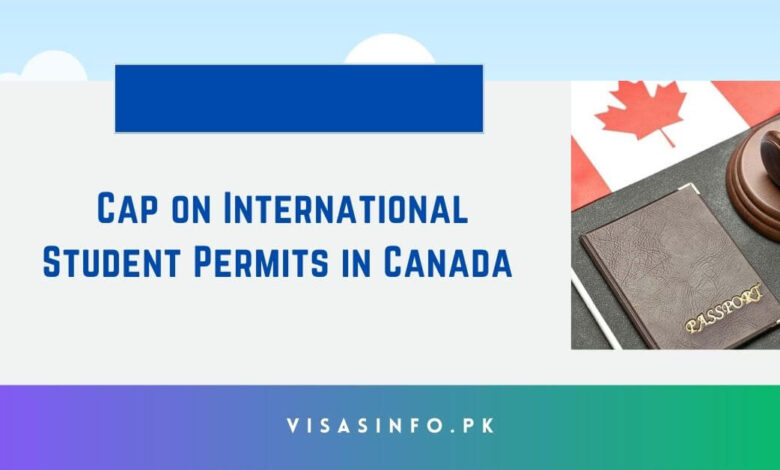Cap on International Student Permits in Canada 2024

It is intolerable that numerous private universities have exploited foreign students by charging exorbitant tuition prices, operating on underfunded campuses with minimal student support, and substantially increasing their enrollment of overseas students. The government of Canada has announced three primary initiatives to prevent this.
1. A Temporary 2-Year Cap on New International Student Permits
This is the most recent in a series of measures designed to enhance the integrity of the program and to prepare international students for success, thereby enabling them to maintain a sustainable level of living in Canada temporarily. Canada has implemented a two-year national application intake limit for 2024 to avoid future increases in the number of foreign students studying in the country.
As a consequence of the restriction, an estimated 364,000 study permits will be granted, representing a 35% decrease from 2023. Additionally, we are allocating the cap space to each province under their population to ensure fairness. In light of this, other provinces will experience significantly larger reductions.
The provinces and territories will be responsible for allocating the cap among their specified learning institutions under their purview. Therefore, we will maintain close collaboration with them to implement these measures. I have already engaged in productive discussions with British Columbia and Ontario, and we all concur that additional efforts are necessary to ensure the integrity of our system while supporting international students.
Furthermore, applicants are required to submit a provincial attestation concurrently with their study permit application, effective immediately. The cap does not apply to students who are pursuing master’s and doctoral degrees at graduate institutions. Furthermore, individuals who are applying for study permits at the primary and secondary school levels will be exempt.
By September 1, 2024, Postgraduate Work Permits will be unavailable to public and private institution models.
2. Open Work Permit Eligibility
We will be announcing in the coming weeks that the sole individuals eligible for open work permits will be the spouses of overseas students enrolled in master’s and doctoral programs, as well as professional institutions such as law and medicine.
The eligibility of spouses of international students who are enrolled in undergraduate and graduate programs will be discontinued. It is important to note that the limit will not affect study permit holders who are currently in Canada or applicants who wish to extend their studies within the country. This is because it would be unjust to prevent someone from completing the program.
New applications for study permits will be considered beginning in 2025, following the implementation of these interim measures for two years.
The Integrity of Canada Education System – IRCC
International students considerably contribute to the social, cultural, and economic fabric of Canada, as well as enrich our communities. The protection of the overseas student system has been compromised in recent years. Several universities have significantly increased enrollment to increase income, resulting in students entering Canada without the requisite resources to succeed.
The rapid influx of international students into Canada is also putting a strain on the country’s housing, healthcare, and other resources. The government is making strides to stabilize the number of international students in Canada to better safeguard international students from malicious actors and promote sustainable population development in Canada.
Summary of Latest Government Action to Reduce Student Migration
Mark Miller, Minister of Immigration, Refugees, and Citizenship Canada, has announced that the Canadian government will reduce the number of international student permit applications for two years, commencing in 2024, to stabilize new development.
As a consequence of the restriction, an estimated 360,000 study permits will be granted, representing a 35% decrease from 2023. The provinces with the highest rates of unsustainable growth in their populations of international students will experience significantly more dramatic cuts, as individual provincial and territorial limits have been established in the spirit of justice. These caps are weighted by population.
The renewal of study permits will not be affected. Individuals who are pursuing elementary and secondary education, as well as those who are pursuing doctoral and master’s degrees, are not subject to the limit. Individuals who currently possess study permits will not be affected. The IRCC will distribute a portion of the cap to each province and territory, which will then distribute it among their designated learning institutions to implement the limit.
An attestation letter from a province or territory will be required for each study permit application that is submitted to the IRCC starting on January 22, 2024. Provinces and territories are required to establish a procedure for issuing attestation letters to pupils by March 31, 2024, at the latest.
Details for Cap on International Student Permits in Canada
These interim measures will be in effect for two years, and the number of new study permit applications that will be approved in 2025 will be reevaluated after this year. Throughout this period, the Canadian government will continue to work in conjunction with designated learning institutions, national education stakeholders, and provinces and territories to establish a sustainable future for international students..
This encompasses the completion of the framework for recognized institutions, the determination of the maximum number of international students that can be sustained in the long term, and the assurance that postsecondary institutions can accommodate an adequate number of students in accommodation.
Check Also: Student Visa Priority Processing for Australia
Benefits of Cap on International Student Permits in Canada
- Quality of Education: Canadian institutions can guarantee that each student receives a higher quality of education and more personalized attention by restricting the number of international students.
- Resource Balance: The management of resources, including accommodation, academic support, and campus facilities, can be improved with a reduction in the number of students. This ensures that all students have access to the services they need and prevents overcrowding.
- Labor Market Stability: A cap is implemented to prevent the oversaturation of the job market with graduates in specific disciplines, thereby guaranteeing that both domestic and international students have improved employment prospects upon graduation.
- Community Integration: The integration of a smaller number of international students into local communities may be more effective, as it can cultivate cross-cultural understanding and mitigate potential social tensions.
- Enhanced Student Experience: Universities can provide a more enriching experience through extracurricular activities, networking opportunities, and student support services, which may be overextended with larger enrollments when the number of students is more manageable.
- Concentrate on High-Quality Applicants: A cap enables Canadian institutions to be more selective, potentially enticing students with strong academic and professional backgrounds, thereby enhancing the reputation of Canadian education on a global scale.
Summary Section II
To enhance its alignment, we are revising the eligibility criteria for the Post-Graduation Work Permit program. Effective September 1, 2024, international students who are enrolled in study programs under a Curriculum Licensing Arrangement will no longer be eligible for a post-graduation work permit upon graduation.
Students are physically enrolled in a private college that has been authorized to instruct the curriculum of an Associated public college following the terms of curriculum licensing agreements. In recent years, the number of international students enrolled in these institutions has increased significantly, although they have less oversight than public universities and serve as a loophole for eligibility for work permits after graduation.
Graduates of master’s degrees and other brief graduate-level studies will shortly be eligible to apply for a three-year work permit under the current regulations. The duration of a post-graduation work permit is solely determined by the duration of an individual’s educational program, which complicates the process of obtaining employment experience and potentially becoming a permanent citizen for master’s degree candidates.
Spouses of foreign students who are pursuing master’s and doctoral degrees will be granted open work permits in the upcoming weeks. Those who are enrolled in undergraduate and graduate programs at other levels of education and the spouses of overseas students will no longer be eligible.
The substantial actions are consistent with other modifications to the international student program that were recently disclosed. When combined, they aim to ensure that genuine students have the resources and support they need for a fulfilling academic experience, as well as to alleviate pressure on housing, healthcare, and other services by stabilizing the total number of students entering Canada.
Frequently Asked Questions:
-
Is there a cap on international student visas in Canada?
“The national cap is based on the amount of expiring study permits this year. This means that the number of international students coming to Canada in 2024 should be the same as the number of students whose permits expire this year. For 2024, the target is 485,000 approved study permits.
-
What is the limit for international students in Canada?
For the next two years, the new cap will place a limit on 360,000 study permits per year, a 35% decrease from 2022 levels. That 360,000 total would bring the number of foreign students entering Canada back to about 2018 levels (excluding COVID-19 effects in 2020).
-
In Canada, what is the cap for international students?
Is Canada banning visas for foreign students? No. Canada’s immigration department is reducing the number of new study permits it will process for international students in 2024 and 2025. It has set a limit, or “cap,” for processing 606,250 study permit applications for affected programs in 2024.



